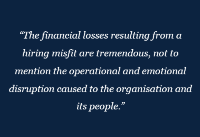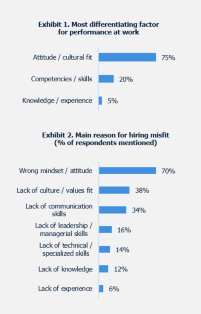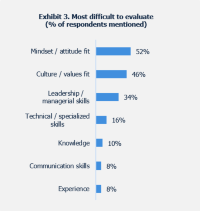How does a penguin end up in the desert?
Survey results: The ‘attitude’ challenge of your hiring process – and three things you can do about it.
Joyce, once a brilliant marketeer at a fast-growing online retail scale-up, just didn’t seem to be able to find her way at her new employer, a global FMCG company. It seemed that everything she was good at earlier just didn’t work anymore. The rules of the game were very different, and she didn’t get along with the people either. She felt lost and was not looking forward to her upcoming performance review…
A promising new hire with proven track record that ends up as a failure at your company – sounds familiar?
In our daily consulting work, we often see this painful problem. Our survey on this business-critical topic shows that 45% of executives are confronted with hiring misfits.
The high cost of a bad hire
Hiring the wrong person is one of the most time-consuming and costly mistakes you can make.
Apart from the direct financial hit, significant hidden costs will permeate throughout the organisation due to the loss of time and energy, disrupted client relationships, reduced productivity and morale and culture degradation. Moreover, these negative effects are amplified in case of senior leadership level roles because of the increased level of influence they have.
It’s all about attitude!
Attitude is THE most differentiating factor for performance at work, both positive and negative.
75% of our respondents identify attitude as the most differentiating factor in the performance of their best employees (Exhibit 1). Having a continuous learning mindset has been mentioned most frequently, followed by having a positive attitude, being a team player and being results oriented.
Additionally, in terms of disqualifying characteristics, the number one reason for hiring misfits is a mismatch in attitude, mindset and/or cultural fit, mentioned by 84% of executives (Exhibit 2). In addition, a lack of communication skills is also frequently mentioned as an important cause for hiring misfits.
The hiring challenge is all about attitude… again!
Respondents say that mindset/attitude fit (52%) and culture/value fit (46%) are the qualities that are most difficult to evaluate (Exhibit 3).
When there is strong pressure to hire, the problem gets even worse: 36% of respondents start to compromise on mindset/attitude or culture/value fit.
Finally, 67% of respondents recognise that they sometimes feel something is not right and find difficulty in naming it after an interview.
How to avoid penguins in the desert - 3 things you can do to avoid attitude misfits
1. Go beyond the standard job description
Create a base-line that explicitly specifies the differentiating factors for success in terms of attitude, values and motivational context in each job profile.
Since this is not common practice, companies may find it difficult to do this. In fact, creating such a base-line is very doable and can be done using techniques such as conducting cultural values assessments and interviewing key stakeholders within the company.
Once the base-line has been created, it can be translated into wanted and unwanted behaviours one can evaluate using quantitative and qualitative methods that tap into the world of values, beliefs, emotions and hidden underlying motivational forces of the candidate. Examples of these techniques are the standard (STAR) interviewing method, personal values assessment or insight generating discussions on attitude fit using drawings (e.g. self-portraits) or a set of pictures.
2. Build “attitude assessment” competency in your organization
Increase the awareness level within your company about critical success factors for performance and/or misfit and make sure that the base-line and associated wanted and unwanted behaviours are thoroughly understood by everyone involved in the hiring process. In addition, get every person involved in hiring interviews up to standards on interviewing skills and personal (unconscious) biases. Interviewing and evaluating behaviours is a skill, but it is a skill you can learn.
3. A structured hiring process pays off
Having a structured and standardised approach for conducting hiring interviews and getting to hiring decisions as well as holding structured training and evaluation programs for interviewers are mandatory if you want to professionalise your hiring process. Think of it. We do this for virtually all other business processes, be it sales, production, IT development, etc. Your hiring process deserves to be taken seriously too.
About the authors
Geert Vercaeren
Geert is passionate about shaping, implementing and leading sustainable transformation programs to improve performance, build capabilities and strengthen behaviour.He is a senior business consultant and coach with more than 25 years of experience in leading complex business transformation, organisation development and HR transformation projects.
He has handled different executive roles in leading consulting firms such as PwC and Deloitte. In all his work, Geert starts his project with the challenges and ambitions faced at business level and integrates psychologically-informed approaches focussing on underlying motivational forces, deeper sources of energy and behavioural patterns.
Geert holds an MA degree as a Commercial Engineer, an Executive MA degree in Clinical Organisational Psychology from INSEAD and a Co-active® Coaching certificate from The Coaches Training Institute. Geert is the founder of B15, a consulting company dedicated to humanising strategies.
Wouter van Essenberg
Wouter is a senior HR leader and consultant who specialises in HR and change management. He is passionate about helping organisations, teams and individuals develop and get to results.
He has gained extensive experience advising executives as a consultant at The Boston Consulting Group. He also possesses hands-on experience in senior management roles, most recently as a member of the Executive Committee and HR director at Ordina, a publicly listed ICT services provider. Currently, Wouter works as a consultant and interim HR leader through his own company, Strategy2impact.
Wouter utilises his combined consulting and managerial experience to help organisations achieve their goals by connecting people with strategy. After all, a strategy will only work when it has the power to inspire and mobilise people.
Wouter holds an Executive MA degree in Clinical Organisational Psychology from INSEAD (EMCCC), an MSc degree in Physics from the University of Utrecht and he has completed his education as a professional coach at School voor Coaching.








